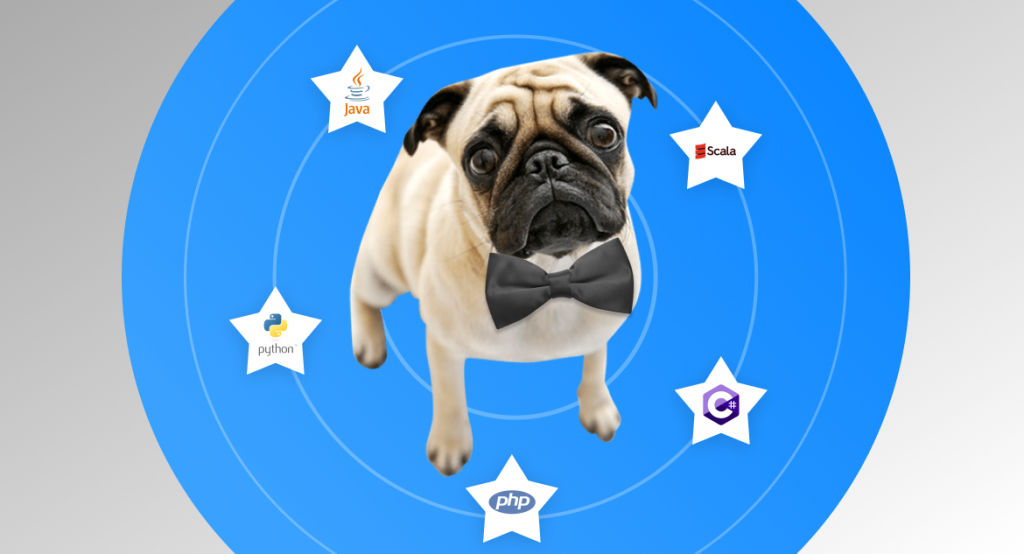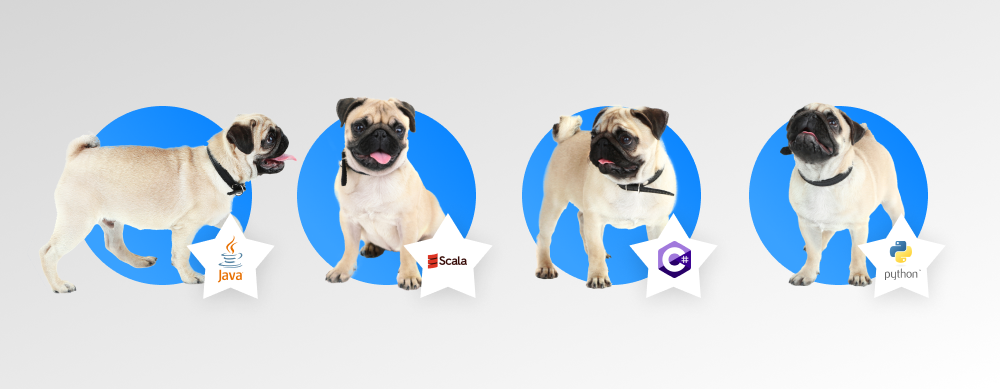On February 4, 2004, Mark Zuckerberg and his fellow students from Harvard University launched a project which is now one of the greatest players of BigTech. Initially, Facebook was created in pure vanilla PHP. On its long way to the modern giant position (about 2 billion people currently use this social media every day), Facebook needed much more than this general-purpose scripting language. So, they developed Hack — their PHP alternative, and now also take advantage of a set of other programming languages and solutions to offer its users more than just an online directory to connect people.
In our article, we are going to reveal the best possible alternatives to PHP for developing successful web projects in 2021.
written by:
Alexey Krutikov
PMP, Project Manager,
Qulix Systems
Contents
PHP Uncovered
When did it all start? Back in 1994, Rasmus Lerdorf created a suite of scripts named “Personal Home Page” — that is what the abbreviation PHP initially stood for — and used those scripts for maintaining his personal home page. The idea evolved into the creation of a simple and highly effective programming language for the new trend of those times — web applications. In 1995, Rasmus Lerdorf released the source code of PHP/FI Version 1.0 to the public, thus beginning the new era of web development.
According to W3Techs, in September 2021 out of all the websites with server-side languages known to us, 78.9% use PHP. One essential fact, that contributes to such vast popularity of PHP, is that WordPress (with a 42% share of all sites on the web), and also Joomla and Drupal use it. PHP is one of the most common and most popular web programming languages (according to StackOverflow, it is the fifth in the tagging list). What are the reasons for its popularity?
Good Guy
Combinability. One of the main advantages of PHP for web development is its high level of flexibility and combinability to adapt to various web projects. It is a cross-platform language — for programming, specialists can use any of the operating systems: Windows, macOS, or Linux. PHP is compatible with cloud services and delivers embedded HTML coding. Also, the language has a wide range of open-source development tools, powerful frameworks (Laravel, CodeIgniter, and others), and connections to practically any of the databases available today.
Easy to Entry. Beginning a PHP programming career does not resemble survival of the fittest. PHP provides a lot of available open-source documentation and learning solutions with increasing difficulty.
Large Community. Probably, that is why there is a large community of PHP programmers (according to some opinions, about 5.5 million specialists worldwide). So, if there are any troubles with the code, it shouldn't be a great problem to find some additional help.
However, with so many advantages, PHP, for now, occupies only the fifth position in the list of the popularity of programming languages by PYPL. Moreover, as the latest StackOverflow Insights show us, PHP is on the top list of the least loved and wanted, and the most dreaded programming languages in the professional community. Why doesn't it have the proper recognition? Let's have a quick view of what distracts programmers from using PHP.
Bad Guy
Not a Fav. A large community and seeming simplicity for novices is not always a blessing. Underqualified PHP developers have generated tons of bad code. And PHP is a forgiving language — it is less focused and the script does still run, ignoring minor faults. That may lead to a snowball of errors and security flaws to struggle with.
When it comes to finding a high professional, it may turn into a really painful challenge. Because in fact, the use of PHP is declining eventually as there are numerous widely used PHP alternatives with better performance and advanced features.
Security Concerns. The bad code we’ve mentioned before is highly vulnerable to malicious attacks. Moreover, even the best PHP coding can contain vulnerabilities. The open-source nature of the programming language means that all security flaws become common knowledge, and before they are fixed in new updates for PHP, they may lead to really serious consequences, like stealing cookies, inserting malicious code, hijacking sessions, and getting access to sensitive data.
Slow and Slower. Is it the truth or just a legend that PHP is slower than other scripting languages? Actually, PHP code requires an interpreter to be presented as a set of instructions for the computer. On the contrary, a compiled scripting language, like Java, generates code in the form of binary code, which is read by a computer without any additional support. Thus, using PHP with an interpreter takes more time.
Additionally, PHP can also be regarded as slow in terms of development. PHP has several libraries but they are not competitors for Python libraries, for example.
What is the Best PHP Alternative?
With all its advantages and disadvantages, PHP is far from being the only possible programming language for back-end web development. However, should we rush towards new alternatives to PHP? Or “the best is the enemy of the good”? Let's see, what alternatives to PHP we have today.
Java/Scala
These two very popular programming languages of modern times can be called close relatives — in theory, they are cross-compatible with each other. They both are good PHP alternatives. Are they completely the same? Well, not really.
Java is an object-oriented language of a general purpose and high-level structure. The famous slogan of Java developers — write once, run anywhere — derives from the ability of Java code to run anywhere over Java Virtual Machine without recompilation. It delivers stable support for concurrent and parallel execution of tasks. The language is well-typed, allows writing less baggage code, and offers powerful web frameworks (JEE or Spring). And the community of Java developers is estimated at 9 million programmers worldwide.
Scala is an object-oriented language of a general purpose that is statically typed and supports functional programming. Its code can be compiled into Java bytecode and run on a JVM. But Scala has case class support and automatic type interference to customize code according to the specific needs of the projects. Scala's most popular frameworks are Play and Lift. And the language is in more favor among developers than Java and PHP.
Java/Scala or PHP? Java and Scala are both object-oriented, and they are fast in both aspects: performance and writing code. These languages are secure, robust, and have advanced tool support.
C# (.Net)
C# is a multi-paradigm general-purpose language, introduced by Microsoft along with .Net framework and integrated development environment Visual Studio, as well as numerous well-built libraries. It is an object-oriented language that is strong in terms of performance and features. As a product by Microsoft, C# provides several free development tools and a set of paid products of exclusive performance. C# was built to perform on the Microsoft platform but now it works for all platforms, mobile and web applications, and other projects. The self-sufficing Microsoft development ecosystem provides robust security, fast performance, and, as many developers note, “elegant” code. That is why C# is widely used for large projects.
C# or PHP? C# is a solid product of Microsoft — fast, secure, and robust.
Python
The last in our list but not the least is Python. It can be found on the top of different ratings of the most preferred programming languages for web applications. Python is the most wanted one from the point of view of programmers, according to StackOverflow.
Python is a general-purpose high-level programming language. It is an interpreted and object-oriented scripting language. It is called by its developers a “glue language” for connecting all the components of the project. That means that Python can be used for back-end development, web, and mobile applications, artificial intelligence solutions, machine learning, and data analysis. It is a versatile tool with easy-to-understand syntax based on simple English keywords and is suitable for all major platforms. Python has a robust library and offers great frameworks — Django and Flask. And the support community is terrific.
Python or PHP? Python is fast, multipurpose, future-oriented, and secure (Facebook and Google use it).
Summing It Up
Well, is it worth searching PHP alternatives for your web project in 2021? For small amateur web applications, PHP, maybe, is a working option, because of its simple and tolerable nature, combinability, and satisfactorily fast performance. But when it comes to modern complicated projects with advanced requirements, what is the reason to use PHP when it has so many drawbacks?
We've mentioned only some of the best possible PHP alternatives for web development, but their list is much longer, and today we offer exclusive solutions for your projects. Our Custom Software development engineers know how to use the maximum of Java/Scala, C#, and Python for the best performance of your project.
To help you to choose the best tech stack for your project, you are welcomed to contact our specialists. And keep up with our blog for the latest reviews, trends, and insights.

Contacts
Feel free to get in touch with us! Use this contact form for an ASAP response.
Call us at +44 151 528 8015
E-mail us at request@qulix.com









